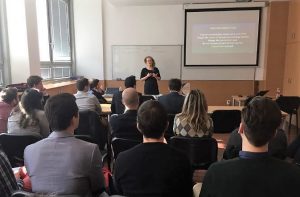Referred to as the EU’s “winter package”, the new rules will partly determine how successfully the EU meets its 2030 climate objectives, as well as setting out a common energy system for the EU’s 28 member states, known as the Energy Union.The collection of documents including revisions to directives, impact assessments, enquiries and new regulations will determine the future of energy in the EU up to 2030. It touches upon subjects including coal subsidies, bioenergy, grid access and rights for individual energy producers.
On 11 March the Hungarian Young Professionals in Energy (Hype) together with Future Energy Leaders (FEL) Romania, of the World Energy Council, organised a joint workshop about the Winter Package, held in Budapest.
In addition to speakers from the two committees, three Keynote Speakers were also present: Hajnalka Kelemen (MAVIR), Pirjo Jantunen, FEL-100 Chair of the Board and Filipe Mota da Silva, FEL-100 Secretary of the Board.
Ms Hajnalka Kelemen’s keynote speech focused on the evolution of the European energy related documents. She noted that the Winter Package is the most complex regulatory document of the power sector.
Mr Andrei Covatariu, Head of International Cooperation at FEL Romania, presented the preliminary analysis of the Romanian committee on the Winter Package. The main findings presented included considerations on energy efficiency, digitalisation of the networks and energy poverty. The study on the Winter Package will continue inside the working groups of FEL Romania during the year.
Mr. George Constantin, the manager of FEL Romania, presented the reorganisation and rebranding process of the FEL Romanian committee, while also focusing on the strategy of the association for the following period. The Programme aims to shape together with the new generation of leaders a unique vision in global energy, while sticking to its core values of diversity, responsibility, authenticity, sustainability and creativity.
Pirjo Jantunen, FEL-100 Chair of the Board, showcased the strategy and the objectives of the FEL Community. Shaping the vision of tomorrow in the energy system, while improving the knowledge and skills of its members are the main goals of the FEL-100 community.
Filipe Mota da Silva, FEL-100 Secretary of the Board, presented an extensive analysis on how energy companies innovate in the digital era. He listed six key fields: uberisation, open data, digital twins, blockchain, collaboration tools and AI, robots and sensors.
Dr. Bálint Hartmann presented the Council’s research paper about storage technologies. He commented: “While wide spread solutions from the classical technologies (like pumped hydro) to the power to gas solution are accessible, they need short-term development in many areas.”
Mr Gergő Holló, the manager of HYPE, introduced the group to the audience. Hype was established 5 years ago and currently has 15 members, most of whom have an engineering or business background. HYPE aims to spread the vision of the World Energy Council in Hungary, the concept of sustainable development while also supports the development of Hungarian energy professionals.
The final presenter was Mr Pál Gerse who gave a brief presentation on the generation situation of Hungary. He highlighted that apart from the Paks II nuclear project, and solar development, there is no other investment expected on the Hungarian market. However, he noted a strong need to introduce capacity mechanisms to stop negative trends, with the country having significant unutilised potential in demand side management.
Nearly 30 participants attended the workshop held at Budapest University of Technology and Economics, with the support of the Department of Energy Engineering.






